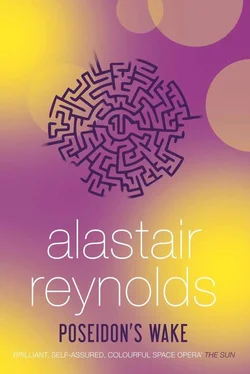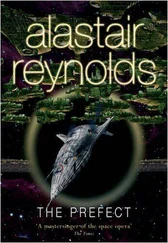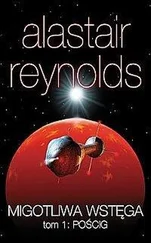‘I don’t think so.’
‘Then we’ll hover until you need us. Good luck, Kanu.’
He dropped the short distance from the flier’s belly into the water. He hit the surface hard and was under before he had taken the shallowest of breaths. He fought back to the surface, coughing, the salt stinging his eyes.
When the coughing fit passed and he had gathered enough air into his lungs, he chanced another submersion. He fought for the depths. Leviathan was further below the surface then he had appeared from the air. Kanu wondered what had drawn the kraken to this particular spot in the ocean. Given the chance, krakens were free-roaming and fond of the cool and lightless depths.
Kanu’s augmented eyes dragged information from the ebbing light. Leviathan was a pale presence below — much paler than he had looked from the air. The iridophores in his body shifted colour and brightness according to mood and concentration. Kanu watched a wave of amber slide along the main body, from eye to tail — a guarded acknowledgement of his presence. But Leviathan’s eye was looking obliquely past him, as if he did not care to meet Kanu’s gaze directly.
Kanu bottled up his qualms. The kraken was huge and he was small, but Vouga would never have allowed him to swim if there was the least chance of injury.
He noticed now that something was occupying Leviathan. The kraken had not chosen this spot randomly. There was a structure here, pushing up from the depths. Massive and ancient, its outlines were blurred by coral and corrosion. Kanu made out four supporting pillars, thick as skyscrapers, and a complicated metal platform like a tabletop. He could not tell how far down the legs went, but the entire thing was slightly lopsided.
It had become a kind of toy for Leviathan. The kraken used his arms to move things around on the upper deck of the platform like a child playing with building blocks. The kraken had a shipping container pincered between two arms, some maritime logo still faintly readable through layers of rust and living accretion. Another pair of arms moved a jagged and buckled crane through the air, then jammed it down on the platform. He placed the container next to it. Even through metres of water, Kanu felt a seismic thud as the objects hit the hard surface.
He swam into clear view of the nearest eye, wider than his body was tall, unblinking as a clock face. Still using the air he had drawn into his lungs, Kanu allowed himself to float passively. He wanted some show of recognition from Leviathan, but the eye appeared to look right through him. The kraken was still moving things around, picking the same things up, putting the same things down.
‘You know me,’ Kanu mouthed, as if that was going to make any difference.
The kraken hesitated in his labours. For a moment he was as still as Kanu, poised in the water, arms moving only with the gentlest persuasion of the ocean currents. Kanu would need to surface again shortly, but he forced himself to remain with Leviathan, certain that a connection — however fragile — had been re-established.
I was away too long , he wanted to say. I’m sorry.
He just hoped that the mere fact of his being there was enough to convey the same sentiment.
But Leviathan could not tear himself from the puzzle of the drilling platform. He picked up the container again, moved it like a chess piece to some new configuration. With a shudder of insight, Kanu grasped that the activity was as unending as it was purposeless. It satisfied the kraken’s need to be moving things, to find permutations of space and form.
At last his lungs reached their limit. He surfaced, conscious even as he ascended that he had slipped beyond the horizon of Leviathan’s attention. The kraken might have been dimly cognisant of his presence for a few moments, but no more than that.
He broke into daylight. The flier was over him, ready to take him back to the seastead. Vouga did not ask if he wished to dive again, and he was glad of that.
The following morning, Kanu was on his way north.
Goma had long held a notional understanding of the starship’s size, but it was quite another thing to be coming up in the shuttle, gaining her first true understanding of the scale of her new home. It was four kilometres long, about five hundred metres across, and resembled a thick-barred dumb-bell with equal-sized spheres at either end. The forward sphere was patterned with windows and access hatches — cargo bays, shuttle docks, sensor ports — while the rearward globe was contrastingly featureless. That was the drive sphere, containing the post-Chibesa engine. Its exhaust, hidden around the sphere’s curve, would eventually boost Travertine to half the speed of light.
Constructing a starship, or indeed a pair of such craft, was still beyond the economic reach of all but a few governments, in all but a handful of solar systems. Two hundred years after Travertine’s work on Zanzibar , the mechanics of a PCP engine still presented fiendish challenges. The new generation of engines were faster and more efficient than the old, but they were no less dangerous to work with, no less unforgiving of error.
But Crucible had committed itself to building two of these ships, banking its future on their construction. It had hoped to tap into the still-young extrasolar trade networks and do business with its stellar neighbours. These ships gave it legitimacy, proving that it had the financial and technical maturity to join the league of spacefaring worlds.
All that had made tremendous sense until the Watchkeepers returned.
The shuttle approached Travertine ’s forward sphere where they docked and transferred inside. There was artificial gravity, provided by the rotation of the ring-shaped interior sections. Ru wanted to see the cabin, but before any of them were allowed to their rooms — or given access to the personal effects shuttled aboard days ago — there was the necessary formality of a meeting with the captain and her technical staff.
All of the crew and passengers — fifty-four souls — convened in the largest lounge, its windows shuttered against the glare of day.
‘Welcome aboard,’ said Gandhari Vasin, spreading her arms wide as if to embrace all of them, technical crew and passengers both. ‘This is a great day for all of us — a monumental day — and a privilege for those of us fortunate enough to be riding the ship. I would like to wish us all a safe voyage and a productive, bountiful expedition. I also extend our collective gratitude to the people of Crucible, for their kindness and generosity in making this expedition possible. It is nothing that we take lightly, any of us. Let us hope for good fortune, for ourselves and for our sister ship, and those who will travel aboard her.’
Goma had already met Gandhari Vasin. She was a good choice, extremely satisfactory to all parties. It helped, perhaps, that she had not been born on Crucible. Vasin had arrived on the planet via the same quarterlight vehicle that had brought Arethusa. A senior propulsion specialist, she had decided that she wished to remain behind on Crucible when the QV departed. She was regarded as non-partisan, and Goma believed that Mposi had favoured her candidature for exactly that reason, aside from her obvious competence.
She was also a cheerful-looking woman with a broad smile and a habit of wearing colourful wraps and headscarves, disdaining titles and the regalia of hierarchy at all times. ‘I am your captain,’ she said, as if it were a kind of confession. ‘This is the role they have given me, and I will do my utmost to be worthy of it. But I am also Gandhari, and I would much rather you call me that than Captain Vasin. We are all going to be aboard this ship for a very long time. Formalities will begin to fade sooner or later, so we might as well dispense with them immediately.’
Читать дальше












